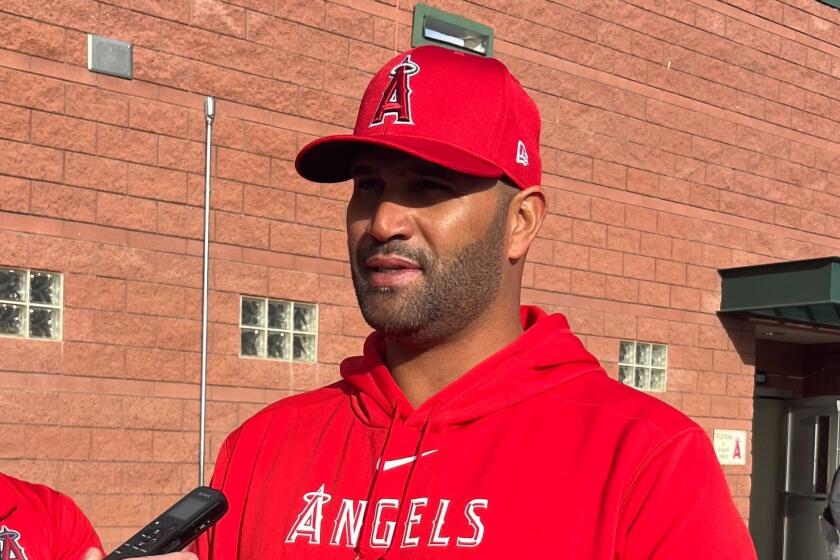Did Anaheim violate Brown Act in Angel Stadium negotiations? Courts twice say no

The plea agreement signed by former Anaheim mayor Harry Sidhu was damning: At a time the city of Anaheim was negotiating a stadium deal with the Angels, Sidhu slipped relevant and confidential information to the team, in the hope the team would thank him with a million-dollar campaign contribution. When the FBI asked him about it, he lied and denied.
The deal ultimately collapsed, but the question lingered: Was the corruption within City Hall limited to the mayor, or did the city itself break the rules?
On Wednesday, for the second time in three years, a court cleared the city of allegations it violated the state’s open government laws in negotiating the Angel Stadium deal.
A three-judge panel of the state appellate court largely upheld an Orange County Superior Court decision that the city had complied with the Brown Act in negotiating the proposed $150-million sale of Angel Stadium and the surrounding property to an entity controlled by Angels owner Arte Moreno.
Under the deal, Moreno’s company would have renovated or replaced the 58-year-old stadium and built a village — homes, shops, restaurants, hotels and offices — upon more than 100 acres of parking lots.
Shohei Ohtani greets Mike Trout and his former Angels teammates, then goes hitless in three at-bats for Dodgers.
For the second time in a decade, Moreno thought he had reached a deal with Anaheim, only to see the city back out. The Angels’ lease extends through 2029, with team options through 2038.
Moreno, 77, told the Orange County Register last month that he had no plans for a third round of negotiations.
“Right now I’d say no,” Moreno said. “I don’t like the word never. Right now I don’t believe [Anaheim officials] have an appetite for it.”
In response, Anaheim mayor Ashleigh Aitken issued a statement in which she said the city would be willing to talk.
“We welcome a fair proposal,” she said. “As a city, we’re committed to building on decades of baseball in Anaheim for generations to come.”
Anthony Rendon’s lukewarm enthusiasm and Mike Trout not ruling out a trade have been the Angels’ spring training headlines. Are there reasons for optimism?
In Wednesday’s ruling, the appellate court panel rejected four of five arguments made by the People’s Homeless Task Force, confirming the Superior Court finding that the city did not improperly negotiate the stadium deal behind closed doors.
The appellate court validated one argument, ruling that the city should have allowed public comment by telephone and not just email during the pandemic, so that citizens could “directly address the City Council.”
“As most everyone has experienced at this point,” Wednesday’s opinion read, “email is easily and often ignored.”
In 2022, the Orange County grand jury blasted not just Sidhu but the council majority that backed him.
“The City Council majority’s inappropriate handling of the stadium property transactions betrayed its constituents,” the grand jury report read.
Albert Pujols was named manager of Leones del Escogido, the Dominican winter league club he grew up watching. He hopes the managing gig is the first step toward his ultimate goal.
The grand jury, which said it started its probe before it became aware of the FBI investigation, said the city had demonstrated “persistent lack of transparency and rushed decision-making in its handling of the stadium property transactions, exacerbating distrust by the public, state and local government officials, and even some members of its own City Council.”
The FBI agent who investigated Sidhu said the former mayor’s actions “may have violated the Brown Act.” Kelly Aviles, the attorney for the People’s Homeless Task Force, said the agent’s report was disclosed after the Superior Court ruling and would not have been considered by an appellate court charged with reviewing whether the Superior Court acted properly with the information it had.
Aviles said she disagreed with Wednesday’s ruling but anticipated her clients would consider the case closed and would not ask the state supreme court to consider taking up the matter.
Mike Lyster, the spokesman for the city of Anaheim, said the city “welcomed” Wednesday’s decision.
“For a second time now, a court has determined that Anaheim followed the Brown Act,” he said. “For whatever other issues may have come to light with the stadium proposal, we stand by the city’s open, public process.”
More to Read
Go beyond the scoreboard
Get the latest on L.A.'s teams in the daily Sports Report newsletter.
You may occasionally receive promotional content from the Los Angeles Times.










